|
|
|
Sort Order |
|
|
|
Items / Page
|
|
|
|
|
|
|
| Srl | Item |
| 1 |
ID:
151115
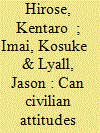

|
|
|
|
|
| Summary/Abstract |
Are civilian attitudes a useful predictor of patterns of violence in civil wars? A prominent debate has emerged among scholars and practitioners about the importance of winning civilian ‘hearts and minds’ for influencing their wartime behavior. We argue that such efforts may have a dark side: insurgents can use pro-counterinsurgent attitudes as cues to select their targets and tactics. We conduct an original survey experiment in 204 Afghan villages and establish a positive association between pro-International Security Assistance Force attitudes and future Taliban attacks. We extend our analysis to 14,606 non-surveyed villages and demonstrate that our measure of civilian attitudes improves out-of-sample predictive performance by 20–30% over a standard forecasting model. The results are especially strong for Taliban attacks with improvised explosive devices. These improvements in predictive power remain even after adjusting for possible confounders, including past violence, military bases, and development aid.
|
|
|
|
|
|
|
|
|
|
|
|
|
|
|
|
| 2 |
ID:
171339
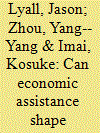

|
|
|
|
|
| Summary/Abstract |
Governments, militaries, and aid organizations all rely on economic interventions to shape civilian attitudes toward combatants during wartime. We have, however, little individual-level evidence that these “hearts and minds” programs actually influence combatant support. We address this problem by conducting a factorial randomized control trial of two common interventions—vocational training and cash transfers—on combatant support among 2,597 at-risk youth in Kandahar, Afghanistan. We find that training only improved economic livelihoods modestly and had little effect on combatant support. Cash failed to lift incomes, producing a boom-and-bust dynamic in which pro-government sentiment initially spiked and then quickly reversed itself, leaving a residue of increased Taliban support. Conditional on training, cash failed to improve beneficiaries’ livelihoods but did increase support for the Afghan government for at least eight months after the intervention. These findings suggest that aid affects attitudes by providing information about government resolve and competence rather than by improving economic livelihoods.
|
|
|
|
|
|
|
|
|
|
|
|
|
|
|
|
| 3 |
ID:
127829


|
|
|
|
|
| Publication |
2013.
|
| Summary/Abstract |
How are civilian attitudes toward combatants affected by wartime victimization? Are these effects conditional on which combatant inflicted the harm? We investigate the determinants of wartime civilian attitudes towards combatants using a survey experiment across 204 villages in five Pashtun-dominated provinces of Afghanistan-the heart of the Taliban insurgency. We use endorsement experiments to indirectly elicit truthful answers to sensitive questions about support for different combatants. We demonstrate that civilian attitudes are asymmetric in nature. Harm inflicted by the International Security Assistance Force (ISAF) is met with reduced support for ISAF and increased support for the Taliban, but Taliban-inflicted harm does not translate into greater ISAF support. We combine a multistage sampling design with hierarchical modeling to estimate ISAF and Taliban support at the individual, village, and district levels, permitting a more fine-grained analysis of wartime attitudes than previously possible.
|
|
|
|
|
|
|
|
|
|
|
|
|
|
|
|
| 4 |
ID:
149669
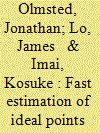

|
|
|
|
|
| Summary/Abstract |
Estimation of ideological positions among voters, legislators, and other actors is central to many subfields of political science. Recent applications include large data sets of various types including roll calls, surveys, and textual and social media data. To overcome the resulting computational challenges, we propose fast estimation methods for ideal points with massive data. We derive the expectation-maximization (EM) algorithms to estimate the standard ideal point model with binary, ordinal, and continuous outcome variables. We then extend this methodology to dynamic and hierarchical ideal point models by developing variational EM algorithms for approximate inference. We demonstrate the computational efficiency and scalability of our methodology through a variety of real and simulated data. In cases where a standard Markov chain Monte Carlo algorithm would require several days to compute ideal points, the proposed algorithm can produce essentially identical estimates within minutes. Open-source software is available for implementing the proposed methods.
|
|
|
|
|
|
|
|
|
|
|
|
|
|
|
|
| 5 |
ID:
179870
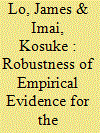

|
|
|
|
|
| Summary/Abstract |
The democratic peace—the idea that democracies rarely fight one another—has been called “the closest thing we have to an empirical law in the study of international relations.” Yet, some contend that this relationship is spurious and suggest alternative explanations. Unfortunately, in the absence of randomized experiments, we can never rule out the possible existence of such confounding biases. Rather than commonly used regression-based approaches, we apply a nonparametric sensitivity analysis. We show that overturning the negative association between democracy and conflict would require a confounder that is forty-seven times more prevalent in democratic dyads than in other dyads. To put this number in context, the relationship between democracy and peace is at least five times as robust as that between smoking and lung cancer. To explain away the democratic peace, therefore, scholars would have to find far more powerful confounders than those already identified in the literature.
|
|
|
|
|
|
|
|
|
|
|
|
|
|
|
|
| 6 |
ID:
110557
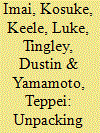

|
|
|
|
|
| Publication |
2011.
|
| Summary/Abstract |
Identifying causal mechanisms is a fundamental goal of social science. Researchers seek to study not only whether one variable affects another but also how such a causal relationship arises. Yet commonly used statistical methods for identifying causal mechanisms rely upon untestable assumptions and are often inappropriate even under those assumptions. Randomizing treatment and intermediate variables is also insufficient. Despite these difficulties, the study of causal mechanisms is too important to abandon. We make three contributions to improve research on causal mechanisms. First, we present a minimum set of assumptions required under standard designs of experimental and observational studies and develop a general algorithm for estimating causal mediation effects. Second, we provide a method for assessing the sensitivity of conclusions to potential violations of a key assumption. Third, we offer alternative research designs for identifying causal mechanisms under weaker assumptions. The proposed approach is illustrated using media framing experiments and incumbency advantage studies.
|
|
|
|
|
|
|
|
|
|
|
|
|
|
|
|
|
|
|
|
|